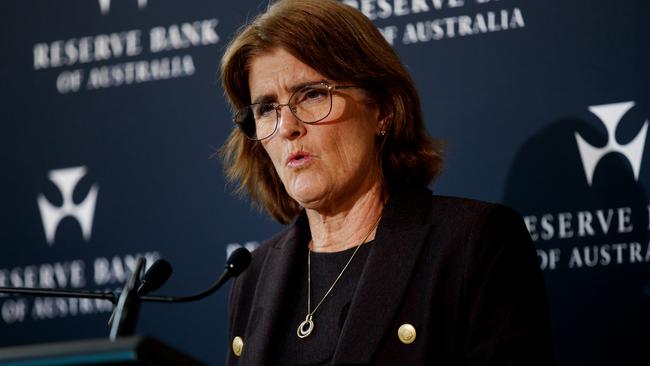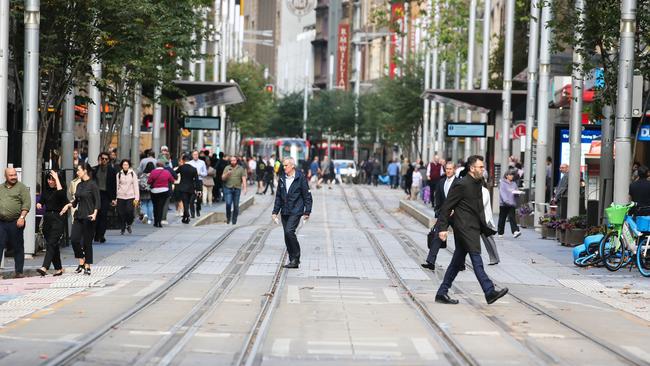Reserve Bank cautions on government spending risks while keeping rates on hold
Recent spending in state and federal budgets could impact demand, putting more pressure on inflation, the Reserve Bank has warned.
Interest Rates
Don't miss out on the headlines from Interest Rates. Followed categories will be added to My News.
The Reserve Bank has cautioned that a cash splash in recent state and federal budgets could risk stoking demand as it kept rates on hold for a seventh straight month.
In a move that was widely anticipated by economists, the RBA held the cash rate steady at 4.35 per cent on Tuesday following its two-day board meeting and offered scant evidence that it was prepared to embark on cuts anytime soon.
Speaking at the post meeting press conference, RBA governor Michele Bullock conceded that while the RBA was still on the “narrow path” in returning inflation to its 2 to 3 per cent target band without tipping the economy into recession, that path was appearing to be “getting a bit narrower”.
“We need a lot to go our way if we’re going to bring inflation back down,” Ms Bullock said.
“The board does need to be confident that inflation is moving sustainably towards target and it will do what is necessary to achieve that outcome.”
As with its meeting in May, governor Bullock confirmed the RBA board also considered the case for an additional rate hike, but did not discuss the option to grant stretched borrowers a rate reduction.
Markets are fully priced for a rate cut by May 2025.
Governor Bullock also noted the recent run of economic data had been mixed and reinforced the need for the RBA to “remain vigilant to upside risks to inflation”.
Price pressures steadily receded through 2023, but progress has since stalled, with annual headline inflation accelerating from 3.4 per cent in December to 3.6 per cent in April, according to the Australian Bureau of Statistics.
According to staff forecasts released in May, the RBA expects inflation to return inside its target band in the second half of 2025.
But in a rare departure from its practice not to comment on fiscal policy, the board said “recent budget outcomes may also have an impact on demand” while also commenting that federal and state energy rebates will only “temporarily reduce headline inflation”.
State and federal governments have announced billions of additional spending in recent weeks, including the $300 power bill discount in Jim Chalmers’ May budget, prompting concerns additional spending could stoke underlying inflation and undermine the RBA’s efforts.
Even as RBA highlighted the risks of government spending, Treasurer Chalmers boasted he was supporting the inflation fight after tipping an extra $24bn of net spending into economy over four years.
“We’re doing our bit in the budget to take pressure off inflation and ease pressure on Australians, with tax cuts for every taxpayer and energy rebates for every household as well as a million small businesses set to roll out from next month,” Dr Chalmers said.

But shadow treasurer Angus Taylor seized on the RBA’s comments, arguing it was “simply impossible” for the RBA to get inflation back to target when government expenditure was so high.
“Stimulus from governments, both state and federal, they are adding to the problem,” he said.
While the recent round of cost of living relief may provide some temporary relief for households, KPMG chief economist Brendan Rynne said it was clear they were also going to create more uncertainty about underlying inflation pressures.”
“This muddies the water for the RBA, potentially contributing to a second round of inflation if the RBA loosens the policy rate too soon,” Dr Rynne said.
As the RBA has aggressively raised rates at its most rapid pace in decades through 2022 and 2023 to counter high inflation, soaring borrowing costs have brought economic growth to a near standstill, with GDP expanding by just 0.1 per cent in the March quarter.
In per-capita terms, GDP has been in retreat for some time. However, some weakness in household consumption is set to be unwound after Labor’s stage three tax cuts and other cost of living relief take effect.
Noting the national accounts figures, the board also said the revisions to consumption and the saving rate suggested further upside risks to inflation.

While economists overwhelmingly anticipate the RBA’s next move will be a cut, analysts predicted the central bank could be forced to hike rates again should the next quarterly inflation reading prove hotter-than-expected.
“Given the board’s concerns about the path of inflation in the very near term the risk sits with a rate increase in August if the June quarter trimmed mean CPI is uncomfortably high,” Commonwealth Bank head of Australian economics Gareth Aird said.
That view was shared by HSBC chief economist Paul Bloxham who considered August’s RBA meeting was a “live” option, despite retaining his base case that the RBA would cut in the 2025 June quarter.
“We see a higher risk of the cash rate being increased further in the second half of 2024, than of it being cut,” he said citing stalling disinflation, near-full employment and elevated unit labour costs which would preclude the RBA from moving earlier.
After imparting less rate hikes and starting later than its international peers in order to preserve jobs gains, the RBA is beginning to lag behind its fellow central banks.
A fortnight ago, central banks in Europe and Canada made their first interest rate reductions of their current cycle. The Bank of England and the US Federal Reserve are also expected to loosen monetary policy later this year.
Originally published as Reserve Bank cautions on government spending risks while keeping rates on hold




